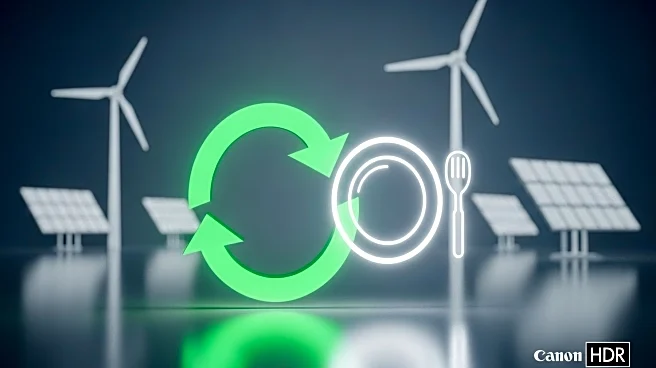What is the story about?
What's Happening?
The food and drink manufacturing industry is increasingly focusing on energy as a strategic advantage rather than just a utility. A new energy playbook has been introduced to guide manufacturers in transforming their energy strategies to reduce costs, enhance resilience, and accelerate decarbonization. The playbook provides practical recommendations and frameworks for manufacturers to protect production from power dips and outages through layered resilience strategies. It also offers solutions for decarbonizing Scope 1, 2, and 3 emissions with auditable and fundable approaches. Manufacturers are encouraged to align energy investments with board-level KPIs and operational outcomes, and to choose the right mix of Solar PV, CHP, Heat Pumps, Battery Storage, and EV charging. The playbook also suggests funding energy transformations with zero capital expenditure through tailored finance models.
Why It's Important?
The adoption of this energy playbook is significant for the food and drink manufacturing sector as it addresses the growing need for sustainable practices in the industry. By transforming energy strategies, manufacturers can achieve cost savings and improve operational resilience, which is crucial in maintaining production efficiency and competitiveness. The focus on decarbonization aligns with global efforts to reduce carbon footprints and combat climate change, making it a vital step for manufacturers to meet environmental regulations and consumer expectations. The playbook's emphasis on aligning energy investments with business goals ensures that sustainability initiatives are integrated into the core business strategy, potentially leading to long-term benefits and market leadership.
What's Next?
Manufacturers are expected to implement the strategies outlined in the playbook, which may involve investing in renewable energy technologies and infrastructure upgrades. As these changes take place, there could be increased collaboration between manufacturers and energy providers to develop tailored solutions that meet specific operational needs. Additionally, the industry may see a shift towards more sustainable supply chains and production processes, driven by the need to meet decarbonization targets. Stakeholders, including investors and consumers, will likely monitor these developments closely, influencing future business decisions and industry standards.
Beyond the Headlines
The introduction of this energy playbook may also lead to broader cultural shifts within the industry, as sustainability becomes a key component of corporate identity and consumer engagement. Ethical considerations around energy use and environmental impact could drive further innovation and transparency in manufacturing practices. Long-term, this could result in a more sustainable and resilient food and drink sector, with potential ripple effects on related industries and global supply chains.
















